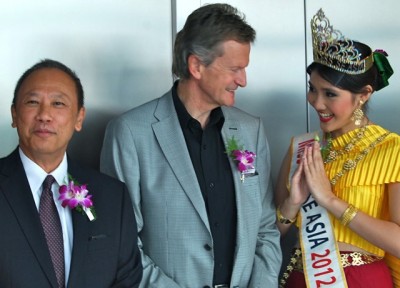Norwegian telecoms giant Telenor is ready to play a major role in helping Burma catch up with the rest of the world. Telenor chief executive Jon Fredrik Baksaas says the company wants t0 engage in nothing less than “nasjonsbygging” (nation-building), after it won a green light from authorities in the long-isolated country to develop its mobile telephone network.

Baksaas is careful to note that Telenor hasn’t actually yet won a license to start building and operating a mobile communications system for Burma, also referred to more willingly in the west as Myanmar after its powerful and often brutal military regime started introducing reforms in 2011.
“We don’t have a license, we have the right to enter into a period of dialogue,” Baksaas told newspaper Dagens Næringsliv (DN) on Friday. But Telenor and state-controlled Qatar Telecom were the two companies that have come that far, after more than 90 mobile phone operators around the world expressed interest in vying for a license to do business in Myanmar. And that marks a huge new breakthrough for Telenor, which already is a major player in Asia from its regional headquarters in neighouring Thailand.
Telenor’s Bangkok office, Baksaas told newsinenglish.no a week earlier, serves as an important hub and gateway for Telenor in Asia and can help Telenor move forward with an expansion into Myanmar. Telenor’s experience in building up mobile operations in Thailand, for example, from zero to more than 26 million subscribers through its stake in local mobile firm Dtac also bodes well for the Burmese venture.
“We want to contribute towards nation-building,” Baksaas said. “There is a fundamental lack of national infrastructure regarding mobile communications (in Myanmar). The potential for building up the society is enormous.”

The profit potential is large as well if Telenor can overcome all the risks that lie ahead. Only between 5- and 10 percent of Myanmar’s 60 million inhabitants have a mobile telephone at present, compared to 85 percent mobile penetration worldwide. The country still suffers daily power failures, though, along with crumbling real estate, poor transportation systems, serious ethnic conflicts, a reputation of rampant corruption and one of the world’s least transparent economies. As TIME magazine recently reported, it also lacks an operational tax system, laws governing industries attractive to foreign investors and a reliable bank lending system.
At the same time, however, Burma is rich in natural resources, has a highly educated population and residents craving everything they’ve lacked for decades, from cars and other consumer goods to communication. Baksaas sees communication as “a catalyst for growth,” and critical for other business and development.
He also sees mobile communications as a “can opener” for closed societies that are opening up. Asked whether Telenor fears surveillance or censorship in Myanmar, Baksaas told DN that mobile technology generally ushers in more openness. He recognizes the potential for problems, and noted that Telenor’s attitudes are “clearly defined in our sustainability principles,” Baksaas said. Myanmar’s new telecoms law will be central to how such issues are addressed and formulated, and Telenor thinks it can contribute through the new right to the forthcoming “dialogue” that it has won.
“The challenges are stacked up, but the possibilities are many,” Baksaas said. He said Telenor expects setbacks along the way, but added that ‘we’re used to that” from other international expansion projects.
‘Zero tolerance’ for corruption
Baksaas has flatly stated that Telenor has “zero tolerance” for corruption and expects local authorities to “operate along the same lines.” He said that “won’t happen overnight, but we look forward to being part of a milieu that can prod this in the right direction.”
The Norwegian government, which long urged democracy in Burma after the Norwegian Nobel Committee awarded its Nobel Peace Prize to opposition leader Aung San Suu Kyi, still owns 54 percent of Telenor and has been busy building relations itself with Myanmar’s new reform-oriented government. Norwegian officials in both the foreign ministry and the ministry for business and trade have been working hard to support the reform process and pave the way for Norwegian companies to invest in the country. Trade Minister Trond Giske was glad Telenor seems in line to get an operating license in Myanmark, but stressed the risks and uncertainty around the billions worth of investments needed as much as Baksaas did.
“We’re very conscious there’s considerable risk in a country that’s in the middle of process towards democracy,” Giske told DN. “The country has come a long way but there can be setbacks.” Both he and Baksaas, though, are optimistic, as are many other international investors and businesses from Google to Ford, Starbucks and Kentucky Fried Chicken. Given its resources, consumer demands and geographic location in every-growing Asia between the huge economies of China and India, it’s a promising frontier that’s transforming itself quickly.
“What’s impressed me the most is how quickly Myanmar has opened up and how quickly people have shed their fear,” one investor told TIME recently. “In the long term, that’s what matters.”
Views and News from Norway/Nina Berglund
Please support our news service. Readers in Norway can use our donor account #3060 24 52472. Our international readers can click on our “Donate” button:

